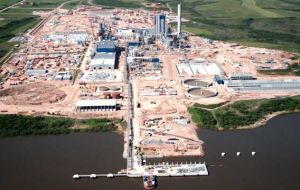MercoPress. South Atlantic News Agency
Following the storm new chances for the pulp mill's conflict
 Botnia-Orion pulp mill in Uruguay
Botnia-Orion pulp mill in Uruguay Sunday's Argentine pickets' “invasion” of neighboring Uruguay attracted considerable media coverage but overall developed peacefully and uneventful. “Invaders” protesting the construction of an allegedly contaminating pulp mill along a river shared by both countries were thoroughly searched before leaving Argentina and again at the other head of the bridge by Uruguayan authorities.
An estimated 850 picketers in a caravan of vehicles with flags, posters and loud speakers marched along the streets of Fray Bentos, which received them with houses covered in Uruguayan flags, to a security perimeter surrounding the Botnia-Orion plant. Protestors read a statement, criticized bitterly Argentine president Nestor Kirchner for being "soft" with Uruguay, forecasted a pollution disaster and marched back home. Local residents which originally were planning a counter march were convinced to patiently tolerate the "provocation", and the whole event ended with a big plus for Uruguay's firmness in the controversy, ample toleration to foreign protestors and sober attitude of officials and residents. In reality the big challenge on Sunday was for Argentine authorities, ensuring that no "hothead" or extremist pickets crossed the bridge to commit any act of hooliganism or unnecessary provocation in Uruguay, since it would further compromise Argentina's position in the three levels where the dispute is under consideration: the International Court of The Hague (Argentine initiative), Mercosur disputes tribunal (Uruguay initiative) and more important the political "facilitating efforts" of the Spanish Crown. Finland's Botnia-Orion pulp mill is Uruguay's largest private investment in the country in the last half century, 1.2 billion US dollars and the launching pad for a local pulp and paper industry taking advantage of the extensive woods planted in the country, a policy started two decades ago with the support of all Uruguayan political parties. Argentine residents in Gualeguaychu, across from Fray Bentos on the river Uruguay, allege the mill is contaminating and will harm their quality of life and one of the city's main industries, tourism. Originally supported by the Kirchner administration, more for political than ecological reasons, the situation got out of control when Gualeguaychu pickets begun impeding normal traffic across bridges given the passivity of Argentine authorities both at provincial and federal level. Uruguay's position has been since then, no negotiations until the bridges are cleared. Argentina would like to see the plant relocated which at this stage when the mill is ready to begin production, seems quite impossible. However with presidential elections in Argentina October 28, the calendar is pushing events. Mrs. Cristina Kirchner, who according to all opinion polls will succeed her husband and president, would like her presidency to begin in December with this irritating conflict out of the way. She will have more urgent issues to address, inflation, energy shortage, increasing corruption allegations involving her husband's cabinet and rebuilding Argentina's foreign standing in world financial and business circles. Actually her campaign manager and current cabinet chief Alberto Fernandez met last week in Colonia, Uruguay, with his counterpart Gonzalo Fernandez, Uruguayan president Tabare Vazquez most trusted advisor and after a long acid exchange reached the conclusion that "this somehow must be solved". The meeting of the Fernandez attorneys, who are also friends from student times, was first denied, later admitted as "secret", and then "reliable" sources gave a few hints of what happened. "Cool tempers" on Sunday, unofficial coordinated security and accepting Spain's political diplomacy suggestions basically: Botnia-Orion will not be rolled back, but Uruguay promises no further mills along the river Uruguay; Argentina and Uruguay will jointly monitor the pulp mill's environmental impact, pickets are gradually lifted. An Ibero American summit is scheduled for early November in Santiago de Chile, where King Juan Carlos will be present. Royal prestige and regional standing should be confirmed with Argentina and Uruguay accepting the suggestions of his diplomacy "facilitating efforts". Before that in mid September both Mr Kirchner and Mr Vazquez are scheduled to participate in the United Nations General Assembly, an ideal opportunity for personal, real-politic dialogue far from flash lights and no erosion to pride or public exposure. This would be sponsored by Spain's facilitator Ambassador Yañez who happens to be Madrid's representative before United Nations. So far both presidents have diplomatically avoided each other when international meetings. Uruguay has also collaborated: in the recent inauguration of port docking and storage facilities, a private undertaking in Nueva Palmira, which will handle all of Botnia-Orion's overseas shipments, President Vazquez was present but strangely enough none of the Finnish company's representatives. The ceremony was short but significant in spite of Argentine pickets in dinghies and yachts. An interesting question is whether Uruguayan authorities will give the OK to the official inauguration of the Botnia Orion plant before October 28 (Argentine election) or November 8 (when the King will be the outstanding figure among the leaders of Spain's former colonies). Botnia-Orion has helped. In a recent trail with chemicals which are to be used in the plant there was a gas leak and several workers intoxicated. Uruguay's Labor Ministry has said no full authorization to operate will be extended until an inquiry reveals what happened and based on it, that all precautionary measures for a no repeat are in place. Finally Sunday the day of the "picketers' invasion" ended with a sweet flavor for Uruguay. Argentina's former Foreign Affairs minister Rafael Bielsa, who on more than an occasion openly suggested Uruguayan officials, from the current and previous administrations, regarding the Botnia-Orion project, were "liars" and had been tempted by "corruption benefits", lost by a landslide in his bid to become governor of Santa Fe province, one of Argentina's main electoral circuits and a stronghold of the ruling Peronists since 1983.




Top Comments
Disclaimer & comment rulesCommenting for this story is now closed.
If you have a Facebook account, become a fan and comment on our Facebook Page!